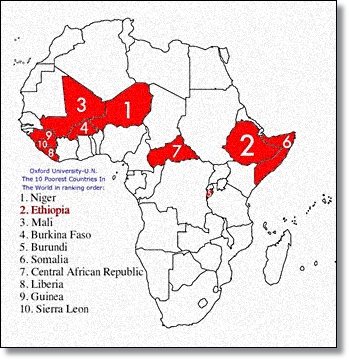Africa: Is the Continent Emerging?

 |
| Countries described by US president Obama as emerging |
Granted that there are volumes of transactions, they hardly transcend to national gains as most African countries cannot sustain their needs without reliance on royalties from extractive industries and foreign aid. Africa has not invested in the extractive industries because no African bank can afford to place $1b in loans on such capital intensive industry.
Recently in Uganda, there was need for about $200m for a telecommunication venture. A consortium of Ugandan major banks could not come up with the loan. The same scenario occurred in Nigeria in the early 1990s when the government under IBB was putting together the LNG project; a $12b venture. Nigerian banks sought participation and IBB agreed to set aside 10% - $1.2b of the project cost for Nigeria banks to fund. They could not.
In the 70s, it was forecast that Africa was the next frontier of investment and most multi-nationals showed interest. While they promoted Africa's potential on one hand, they on the other hand sought to decimate the continent by inducing military interventions and coups. Refer to the cold war as the west and then USSR sought resource control. Africa was an easy prey. The latter factors caused Africa tremendous instability. The indigenization decrees that nationalized foreign owned corporations and companies put the final nail on the coffin. Africa is still held hostage for such a policy.
The undue high returns on land speculation are never sufficient as a single indicator to offer reliable measure for/of growth. Land value escalation in Africa is mostly driven due to limited developable land and concentration on few supplies. Such a condition tends to put pressure on price and in turn, creates artificial returns. When those returns are measured against foreign currencies, they are low.
Considering that most African nations do not have reliable taxation system on gains and reparation of profits is almost 100%, it drains national treasuries as these are charged against foreign reserves. With foreign reserves as a measure of current account capability, most African nations do not have 90-day window on import charges. It is hard for mostly import dependent economies to sustain capital development on infrastructure needs. Africa lacks a local and national framework to help make sense of all the issues that would help it transform.
Africa must stand on its feet and decide which programs and policies would make sense for it grow and develop. Most African banks are correspondent institutions that hardly invest in the economic development of their nations. As correspondent banks for foreign institutions, they make their money mostly on exchange rate fluctuations, transaction fees on short term financing, and carry hardly any long term debt. Borrowing in Africa is never longer than 10 years, and mostly interest only pay-backs, and 30 year terms or longer are not applicable.
Africa has weak legal systems and financial structures. Business development takes long. Information and statistics needed to assess market conditions hardly exist. Colleges and universities are not tuned in for the development of the local economy.
Africans pay the highest interest rate on borrowed money than anyone else. If in the west, the borrowing rate is less than 6% in most cases, Africans are borrowing at 25%. How can the economy grow except it be a transaction economy? Add to the weakness, the leadership is pro-west or pro-east, always willing and bent on accepting what these conflicting and competing geo-political establishments hoist on African nations.
A nation cannot grow by relying and depending on what its neighbor tells it. A nation must filter all that and decide what matters most to it. Africans will always remain a doormat for others until they seek to internally develop and get a grip on runaway issues that tend to keep them crippled in spite of opportunities that will help them emerge.
The excitements some of the western authored reports create only go to make the African 'feel good' but the fundamentals are just not there. What is the exchange rate of Euro/Dollar/Pound to any African nation? It is runs in high double digits and in some cases, 3-6 digits. Look at the Zim Dollar to US Dollar. No African nation has exchange rate to any of the currencies that is in the single digit.
Africans lose value of their savings due to the impact of fluctuating exchange rates. For instance in Nigeria in 1985, the dollar exchanged at $1.00 to N0.60k, meaning the Nigerian currency was more valuable. When I came to US in 1985, I paid N768 for my ticket, which then was an equivalent of $1,280.83. Today 2011, the same route, a Nigerian will pay about N200,000, an annual escalation rate of almost 24%. On the dollar side, which used to have lower exchange value, it has maintained an annual escalation rate of 0.61%, in 26 years. One can still fly to Nigeria on $1,280 round trip fare but in today’s Nigeria, N768.50, buys no one anything of value or utility.
The injections and introductions of World Bank and IMF policies, destroyed African nations. Today, Africa is caught up on whether to love the East - China, or like the West - US/UK, without being firm on what it is they want. A prostitute is never the choice of a good bride. They provide temporary excitement, but always leave alone to their misery as users move on.
Ejike E Okpa ii
[email protected]
